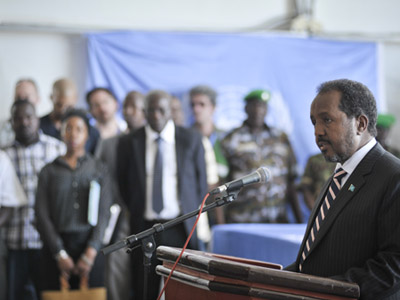
Somali President Hassan Sheikh Mohamoud speaks at the repatriation ceremony for three of the 15 people killed when Al-Shabaab attacked the United Nations compound in Mogadishu, Somalia. The United Kingdom and the European Union will continue to help rebuild the fragile state. Photo by: Tobin Jones / U.N.

Wednesday, June 26, 2013
advertisements
The recent attack on a U.N. compound in Mogadishu has raised fears of possible donor shakeup, but several of Somalia’s top donors seem to not be shaken with the latest security setback in one of Africa’s most fragile states.Fifteen people have reportedly died from the June 19 suicide bombing; the United Nations confirmed the death of four Somali guards, three contractors and one international staff member.
It was a deadly attack that endangered the foundations — however shaky — the new Somali government has tried hard to put in place to win back donor confidence in the country, which for many years has suffered instability and insecurity.
The United Kingdom, one of Somalia’s top donors, has just concluded a major conference on Somalia in May. The European Union is set to hold another conference in September to agree on a new deal for the country and gather support for its success.
But contrary to what Al-Shabab — which took responsibility for the attack — may have hoped, donors are undeterred in helping to rebuild Somalia.
“Security in Somalia has been, is and remains a concern that is factored into our work in Somalia. However the recent attack will not alter the way the European Union operates in Somalia. On the contrary, it will be all the more important to demonstrate that the international community will not be deterred from engaging in the country,” Michael Mann, spokesperson for EU aid chief Catherine Ashton, told Devex.
British foreign secretary William Hague shared the same view.
“We remain resolved to continue supporting the progress we have witnessed in Somalia over the last two years. This kind of attack does nothing to shake that resolve,” he said in a statement.
Re-engagement
Mann said Somalia needs continued humanitarian support as well as “sustainable solutions to its endemic political, security and socio-economic problems.”
The EU has yet to accept Somalia’s accession to the Cotonou Agreement, the basis of the bloc’s development cooperation with developing countries across Africa, the Caribbean and the Pacific. But when this happens, and Somalia ratifies the agreement, Somalia will become eligible for bilateral aid under the 11th European Development Fund.
“The eligibility applies to the bilateral and the regional funds, as well as to the regional thematic facilities, such as the African Peace Facility,” EU communications officer Maria Sanchez-Aponte previously told Devex.
Mann said the bloc is already “working more directly with Somali authorities, supporting Somali priorities.” Its primary focus will be on areas such as building the capacity of Somali institutions, for instance helping improve the government’s public financial management and the rule of law, as well as supporting the African Union Mission to Somalia and Somali security forces.
Canada — now busy merging its development agency into the new Department of Foreign Affairs and International Trade — meanwhile affirmed it will continue to provide humanitarian and development support through U.N. agencies and nongovernmental organizations in Somalia.
“We will also explore, with the Federal Government of Somalia and the international community, ways we can help support stabilization, reconstruction and, ultimately, sustainable economic development efforts in Somalia,” DFAIT spokesperson Barbara Harvey told Devex.
Canada has only recently resumed diplomatic ties with Somalia, appointing as new ambassador its high commissioner in Kenya, David Angell.
“A more representative and accountable government is a critical step toward rebuilding Somalia. We recognize its government faces enormous challenges and will need the support of the international community for some time,” Harvey added.
For the EU, Mann argued: “This attack underlines the need for continuing our engagement in Somalia to help the Somali people live in peace and security, so it will certainly not result in the EU reassessing its plans.”
The international community’s increasing confidence can be pictured in its recent re-engagements with Somalia: Last April, the United Kingdom re-opened its embassy in Mogadishu after more than 20 years.
The United Nations, for its part, has started to boost its presence in the country. U.N. Office for the Coordination of Humanitarian Affairs Somalia head Justin Brady said in April that the global body plans to increase its international staff in Mogadishu from some 25 to 70-90 starting July.
Other heads of U.N. agencies were also planning to relocate to Mogadishu after years of operating from Kenya, although it is now a question how this will push through following the June 19 attack.